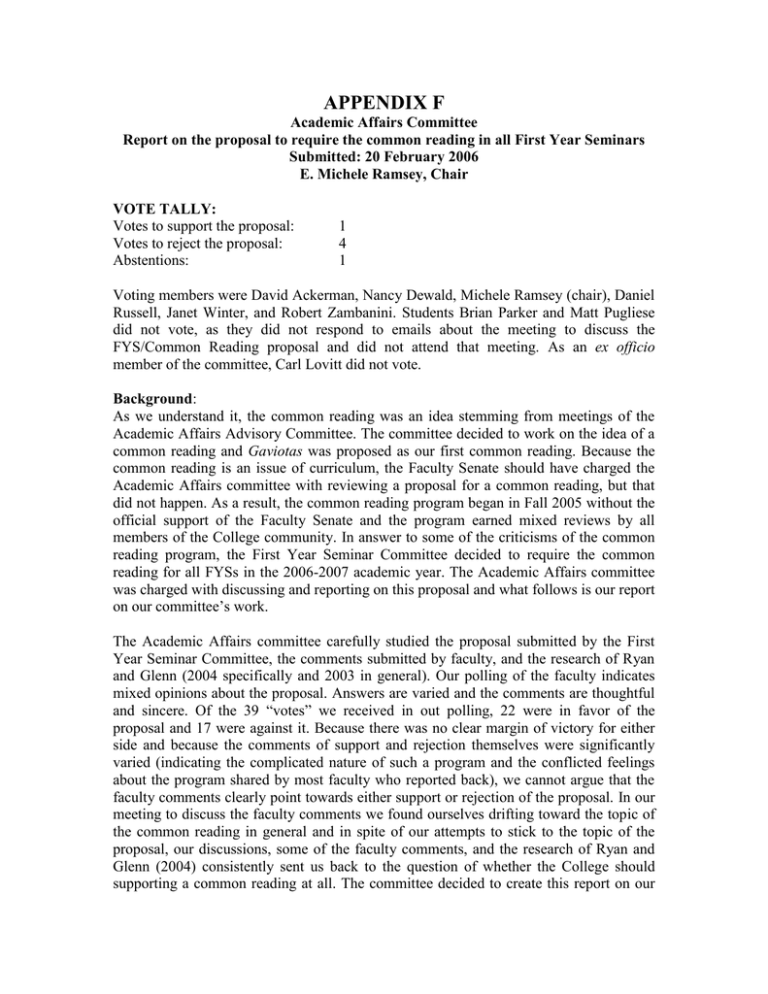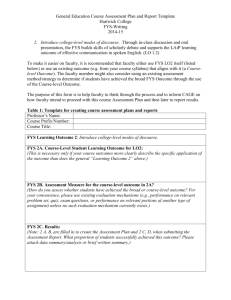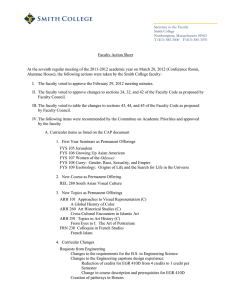Academic Affairs Committee Report on the Proposal to Require the Common Reading in All First-Year Seminars
advertisement

APPENDIX F Academic Affairs Committee Report on the proposal to require the common reading in all First Year Seminars Submitted: 20 February 2006 E. Michele Ramsey, Chair VOTE TALLY: Votes to support the proposal: Votes to reject the proposal: Abstentions: 1 4 1 Voting members were David Ackerman, Nancy Dewald, Michele Ramsey (chair), Daniel Russell, Janet Winter, and Robert Zambanini. Students Brian Parker and Matt Pugliese did not vote, as they did not respond to emails about the meeting to discuss the FYS/Common Reading proposal and did not attend that meeting. As an ex officio member of the committee, Carl Lovitt did not vote. Background: As we understand it, the common reading was an idea stemming from meetings of the Academic Affairs Advisory Committee. The committee decided to work on the idea of a common reading and Gaviotas was proposed as our first common reading. Because the common reading is an issue of curriculum, the Faculty Senate should have charged the Academic Affairs committee with reviewing a proposal for a common reading, but that did not happen. As a result, the common reading program began in Fall 2005 without the official support of the Faculty Senate and the program earned mixed reviews by all members of the College community. In answer to some of the criticisms of the common reading program, the First Year Seminar Committee decided to require the common reading for all FYSs in the 2006-2007 academic year. The Academic Affairs committee was charged with discussing and reporting on this proposal and what follows is our report on our committee’s work. The Academic Affairs committee carefully studied the proposal submitted by the First Year Seminar Committee, the comments submitted by faculty, and the research of Ryan and Glenn (2004 specifically and 2003 in general). Our polling of the faculty indicates mixed opinions about the proposal. Answers are varied and the comments are thoughtful and sincere. Of the 39 “votes” we received in out polling, 22 were in favor of the proposal and 17 were against it. Because there was no clear margin of victory for either side and because the comments of support and rejection themselves were significantly varied (indicating the complicated nature of such a program and the conflicted feelings about the program shared by most faculty who reported back), we cannot argue that the faculty comments clearly point towards either support or rejection of the proposal. In our meeting to discuss the faculty comments we found ourselves drifting toward the topic of the common reading in general and in spite of our attempts to stick to the topic of the proposal, our discussions, some of the faculty comments, and the research of Ryan and Glenn (2004) consistently sent us back to the question of whether the College should supporting a common reading at all. The committee decided to create this report on our findings and opinions regarding the proposal to require the common reading in all first year seminars (FYS). Armed with the proposal, the work of Ryan and Glenn (2004), a summary of faculty comments, and our reports, we send this issue to the full Faculty Senate for discussion, debate, and a final vote. Because we do not all agree on the final report, we offer a majority and a minority report on the proposal to require the common reading in all FYSs. Majority Report of the Academic Affairs Committee The research of Ryan and Glenn (2004) was done at a university very similar to ours. The school’s population seems quite similar to ours, with lower than average entrance requirements, a good number of first generation college students, a high commuter population, and many students working over 20 hours per week off campus. Their research suggests that our College should focus on a skills/strategies-based FYS model rather than a socialization-based model, which we believe comes closest to a FYS that requires a common reading, especially when the reading is not discipline-specific according to major. Ryan and Glenn (2004) differentiate between skills/strategies and socialization-based FYSs. While they do not specifically mention common reading programs, their definition of a socialization-based FYS is very close to the way that the common reading is discussed as a means of improving the first year experience for our students. Ryan and Glenn show that skills/strategies-based FYSs are more effective in promoting academic success within contexts similar to our own. We offer a summary of the research presented by Ryan and Glenn (2004) and discuss these findings within the context of Penn State Berks: • The need for skills-based FYSs: For both more and less academically capable first year students, one year retention rates were higher for students that experienced a skills/strategies-based FYS. 71% of students completing the first semester with a GPA of 2.00 or better tend to remain in good standing and are retained by the college whereas only 32% of students who complete their first semester with less than a 2.00 GPA tend to return for a second year. Perhaps our 86% retention rate reflects that fact that we offer various seminars on skills to our first year students. If this is the case, we should work on continuing to perfect a skills/strategies-based model of the FYS. • The effectiveness of socialization-based FYSs: Socialization-based seminars are slightly less retention-effective than a first year without any first year seminar. This means that the College could be spending a good deal of money and time on something with no demonstrated benefits to first year students or the College. First year students who enroll in skills/strategies-based seminars are significantly more likely to reenroll the following fall than those who enroll in the socialization-focused seminar or in no seminar at all. If we’re more likely to retain students with no FYS than with a socialization based FYS, why would we move toward any socialization-based materials in our FYSs? • FYSs and academic ability: Unlike socialization-based FYSs, skills/strategies-based FYSs have a positive impact on the retention of both academically stronger and academically weaker students. Retention was raised by 9 percentage points for students earning over a 2.0 their first semester and twenty-nine percentage points for students with a first semester GPA of less than 2.0 when students entered a skills/strategies-based FYS. Retention rates of students with high and low incoming high school GPAs who took skills/strategies-based FYSs were higher than those who took socialization-based FYSs. Skills/strategies-based seminars appear to immunize first year students against the damaging effects of poor first semester performance because students tend to attribute their performance to lack of application or effort on their part (“I didn’t apply what I’d learned.”). As a result, those in the strategy based seminar condition may be more motivated to return the following year because they believe they can determine their level of academic success. Conversely, students who had received a socialization focused introduction to college might be more likely to attribute failure to lack of ability on their part (“I guess I’m just not that smart.”). As a result, those in socialization-focused, theme based seminar condition may be less motivated to return to the academic arena the following year because they believe that they do not have the requisite academic ability. Our conclusions: Based on the research that, in our opinion, suggests a common reading based FYS would not help, and may indeed hurt retention (especially in terms of students who are lacking in basic skills when they enter college) and the fact that the faculty are decidedly split on the idea of a common reading and also the idea of requiring it, we encourage the College to consider postponing the common reading program completely until further study can be conducted. If the College insists on a common reading, then we propose that it should not be required. While ostensibly unfair to students, losing several good faculty who already teach FYSs is not worth the hassle over something with no demonstrated benefit. We understand the time and effort that individuals have put into planning the common reading and its connection to the FYS and we recognize that not requiring the common reading will likely reduce its success. However, we should not require something that does not have evidence supporting its efficacy. The rationale given for the common reading is more about common goals and why it should be required across FYS than why a common reading is a good idea in the first place. While the common reading may carry some benefits, we are concerned that it could also negatively impact the very students we're most concerned about, those with poor reading and study skills, and therefore negatively impact our retention rates. We would add that if we continue to advertise Penn State Berks as student-centered, we seem to be defeating our purpose if we are expecting students to complete work that, in effect, may be hindering their success in this first year of college and thus their likelihood of completing a degree, specifically at Penn State Berks. We do not agree with the comparison of this proposal to the practice of groups of faculty in one discipline requiring that certain textbooks or exams are used because the process of those decisions varies distinctly from the process of deciding the common reading. In addition, we are concerned that in allowing a requirement to be set for FYSs may be a slippery slope that could endanger academic freedom in the future (“We required the common reading in all first year seminars, so we should be able to require…”). We suggest that in the future initiatives such as this one are researched before they are begun. One faculty member noted that s/he spoke about the Ryan and Glenn research at the faculty retreat on the common reading this winter and we are confused as to why the suggestion to look into the research was seemingly ignored. Minority Report of the Academic Affairs Committee The common reading and the kind of FYS are actually tied together. Since we do not yet have a consensus on FYS or even have the final report from the FYS committee, the common reading question remains difficult. Based on the research data, college transition seminars were rated highest. However, we are not deciding about the nature of the FYS. A common reading should enhance the FYS experience. In some of the areas rated highly for the college transition seminars, it is possible to use the common reading to do just that, i.e., to provide out of class experiences for students (But, the author needs to be a speaker as well.), to improve knowledge of academic services (library assignments related to the reading), and to improve connections with peers (group discussions, group presentations, and group study question projects). To be fair to our students, all FYSs must require it or none require it. With all of that said, my bottom line would be to require it. But, the book should not be changed every year, and the book needs to be captivating. (At least, it cannot be another Gaviotas). I have not read any of the books and hope my colleagues have selected wisely. References: Ryan, M.P. and Glenn, P.A. (2004). What do first-year students need most: Learning strategies or academic socialization? Journal of College Reading and Learning, 34. pp. 4-28. Ryan, M.P. and Glenn, P.A. (2003). Increasing one year retention rates by focusing on academic competency: An academic odyssey. Journal of College Student Retention, 4.3. pp. 297-320.




